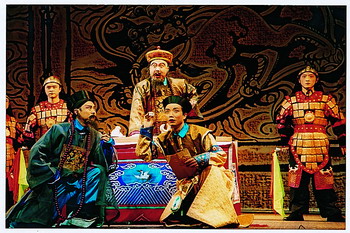As a renowned local opera mainly prevailing in Southwestern China's Sichuan, Yunnan, and Guizhou provinces, Sichuan Opera is characterized by unique solos, refined acting, rich percussion, and talented comedians, whose skills are unparalleled in the world. The opera's application to be enlisted as an Intangible World Heritage is currently pending.
Sichuan Opera features vivid, humorous narration, singing, and acrobatics. It also boasts a system of stylized movements and its acting is both exquisite and lively. Sichuan Opera performances are always full of wit, humor, lively dialogues, and pronounced local flavors. To portray special characters, the opera incorporates a series of stunts, including the famous "face-changing." In Chinese opera, facial makeup is usually painted, but in Sichuan Opera, the performer can change his or her facial makeup in the snap of a finger right on stage.

Most Sichuan Opera repertoires are adapted from the Chinese classical novels, mythologies, legends, and folk tales. Statistics show that the total number of Sichuan Opera plays exceeds 2,000.
Sichuan Opera is noted for its high-pitched tunes, accompanied only by percussion instruments and choruses, without wind or stringed instruments. In addition, this spectacular theatrical presentation features bright sets and costumes, plus a combination of music, dance, and acrobatics. Among China's current 300 local theater traditions, Sichuan Opera has thrived and developed throughout ages as a distinct regional art form.
Its special characteristic -- one that distinguishes Sichuan Opera from other theatrical traditions -- is its immense vitality and dynamic performances that always strive to bring out an individual's artistic abilities into play to ensure fresh material, variety, and creativity. In part due to its intimate connection to a lively treasury of folk songs, Sichuan Opera reveals an extraordinary flexibility and vitality of expression in its music and movements.
The development of Sichuan Opera is intrinsically linked to the natural conditions in Sichuan. The principal agricultural products cultivated in Sichuan's extraordinarily fertile soil include rice, tea, and mulberry trees, whose leaves are used in the traditional industry of raising silkworms. Rustic songs originally sung by boatmen and tea-plantation and rice-paddy workers developed into famous local folk songs, which, in a sense, can be regarded as the precursors of the province's great operatic tradition.
